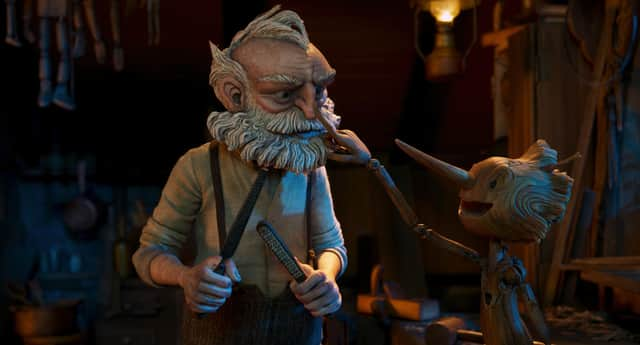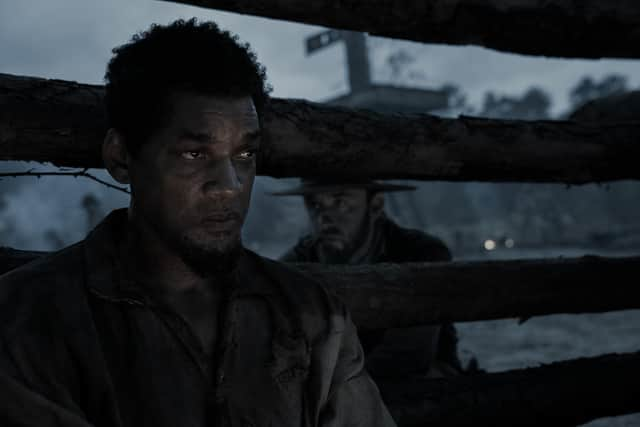Film reviews: Pinocchio | Emancipation | Nocebo | Anonymous Club


Pinocchio (PG) ****
Emancipation (15) ***
Nocebo (15) **
Anonymous Club (15) ***
Unlike the recent live action Disney remake, the second major adaptation of Pinocchio this year has more on its mind than reviving an old bit intellectual property. Mexican auteur Guillermo del Toro and co-director Mark Gustafson’s beautifully rendered stop-motion take on Carlo Collodi’s nose-growing fairytale updates it by setting it in Mussolini’s Italy, where this fable about fibbing takes on a more frightening political dimension, one that’s sadly relevant for our own chaotic, fake-news-saturated times. That’s par for the course with Del Toro, though; he’s always found ways to root the horrors of his more phantasmagoric work in everyday evil, whether it’s the Franco-era setting of his anti-fascist fantasy films The Devil’s Backbone and Pan’s Labyrinth, or the sinister Cold War paranoia of his Oscar-winning monster movie The Shape of Water.
Here, familiar aspects from the Pinocchio story find their counterpoint in a world in thrall to a real-life puppet master, with the Pleasure Island segment now a Balilla bootcamp for boys (the Italian equivalent of the Hitler Youth), and Del Toro celebrating the impish Pinocchio’s mischievous behaviour as a necessary force to defeat authoritarianism. None of which is to suggest it’s not suitable for kids; the film is great at keeping a child’s eye perspective and anyone weaned on Studio Ghibli will go with the flow of its strangeness, which includes a narrative riff on Groundhog Day featuring a Cate Blanchett-voiced spirit who controls the underworld and Tilda Swinton as her life-force-giving sibling (the closest the film has to the Blue Fairy). Ewan McGregor is also charming as the voice of Sebastian J Cricket, Pinocchio’s insect guardian angel and this film's narrator. And there’s a playfully malevolent vocal turn too from Christoph Waltz as the duplicitous theatre impresario Count Volpone. The end result is a film that’s bizarre, beautiful, really smart and full of heart.
Advertisement
Hide AdA decade on from turning down the lead in Quentin Tarantino’s Django Unchained, Will Smith now stars in Emancipation, a far more conventional B-movie-flavoured slave drama from blockbuster director Antoine Fuqua (Training Day, Olympus Has Fallen, The Equalizer). The film casts Smith as "Whipped Peter", a real-life figure whose horrific scarring at the hands of Southern slavers became a galvanising image of the abolitionist movement after his photograph was taken in 1863. Before the film gets to the inevitable taking of that photo, though, it’s largely built around his harrowing escape from a brutal work camp, where he’s been sent by his previous owner to put his blacksmith skills to work on the railroads, wrenching him away from his family in the process.


Though spurred on by the news of Lincoln’s Emancipation Proclamation, which declared all slaves free two years before victory was secured over the Confederacy, he realises his only chance for freedom is to seize it for himself. What follows is a bluntly effective chase thriller through the alligator-infested swamps of Louisiana, with Ben Foster on sinister form as Smith’s racist-to-the-core pursuer, and Robert Richardson's desaturated cinematography (which mixes almost monochrome images with hellish flashes of colour) giving the whole film a nightmarish quality. However, Fuqua is also prone to action movie clichés, which are at odds with Smith’s admirable efforts to play Peter as a more complex man – someone driven both by a love for his family and a desire to fight his oppressors, but also someone coming to a realisation that, for all his suffering, freedom still comes with many more caveats for people who look like him.
Clumsy execution and an all-too-obvious twist mar Nocebo, a supernatural-themed chiller starring Eva Green as a children’s fashion designer struck down with a mysterious psychological malady that’s sent her hitherto perfect life off the rails. Confounding her doctors, frustrating her husband (Mark Strong) and having a detrimental effect on their somewhat neglected eight-year-old daughter (Billie Gadson), her condition has left her a nervous wreck, prone to the shakes, memory loss and hallucinations. But when a Filipino nanny (Chai Fonacier) whom she can’t remember hiring shows up on her doorstep to help look after her and her daughter, it’s not long before she starts getting back to some semblance of normality, even if her husband’s suspicions regarding this folksy interloper’s Mary Poppins routine starts driving a wedge between them.
Caught between its desire to be an ambiguous psychological thriller, an occult horror and a sociopolitical genre piece, the film struggles to satisfy any impulse as director Lorcan Finnegan (who made the similarly stretched-thin Vivarium) fails to inject much tension or fear into its trauma-driven plot. Visually, there are some nifty Brian De Palma touches, but Green can’t do much with a film that reduces her character’s mental deterioration to campy hysteria.
Australian rock star Courtney Barnett is the subject of Anonymous Club, an intimate documentary portrait of life on the road for someone grappling with the mental toll of being a popular artist who’s really just trying to figure things out for themselves. Directed by long-term collaborator Danny Cohen, the film is built around a series of audio diaries he encouraged Barnett to record as she was gearing up to tour the follow-up to her Grammy-nominated, gold-selling debut Sometimes I Sit and Think, and Sometimes I Just Sit. Though it’ll mean more to fans than casual listeners, the way the film juxtaposes her innermost thoughts with the promotional demands that come with releasing music that really connects with people is fascinating to watch.
Pinocchio streams on Netflix from 9 December; Emancipation streams on AppleTV+ from 9 December; Nocebo and Anonymous Club are on selected release from 9 December.